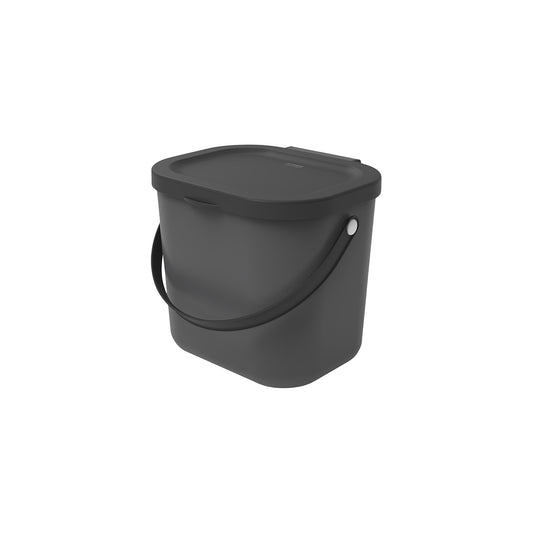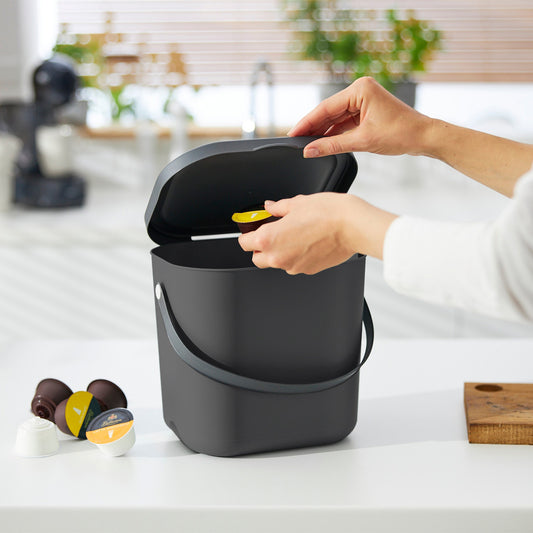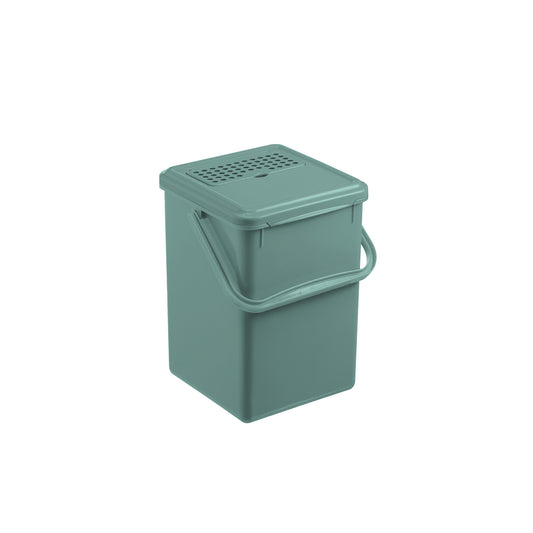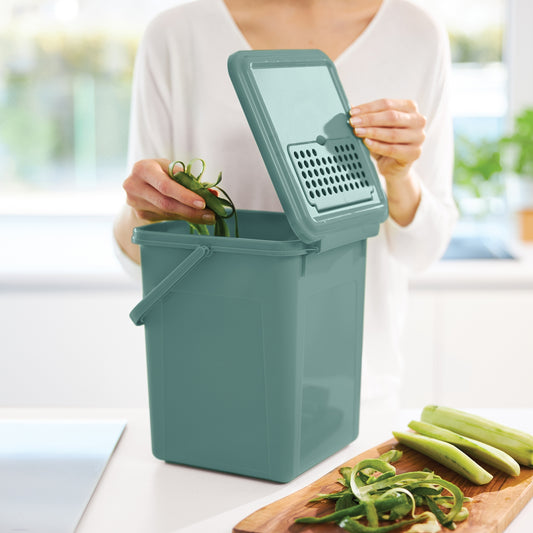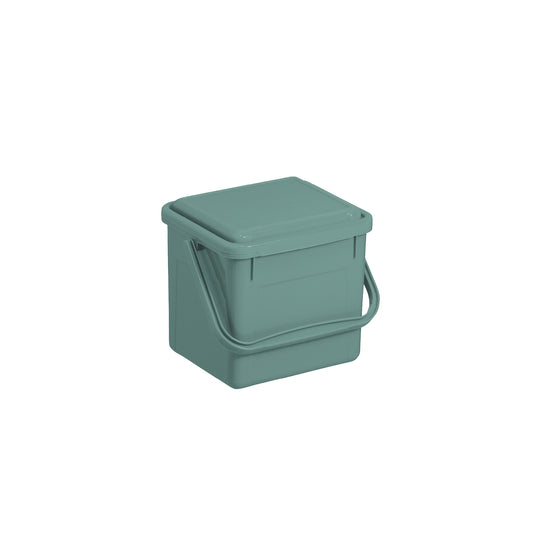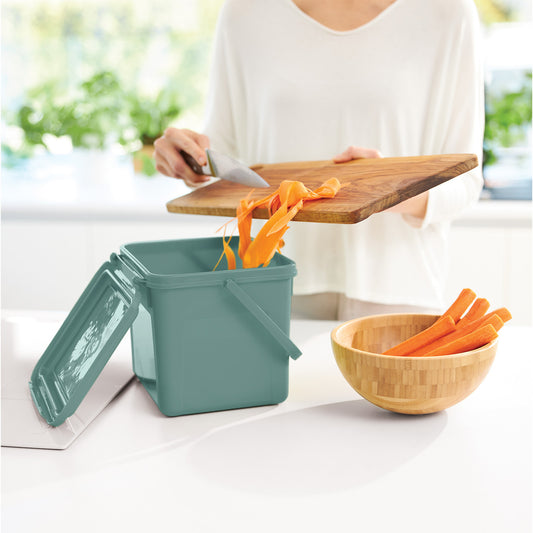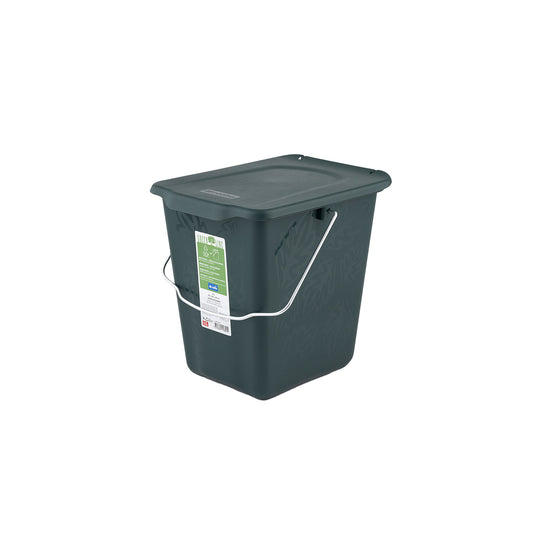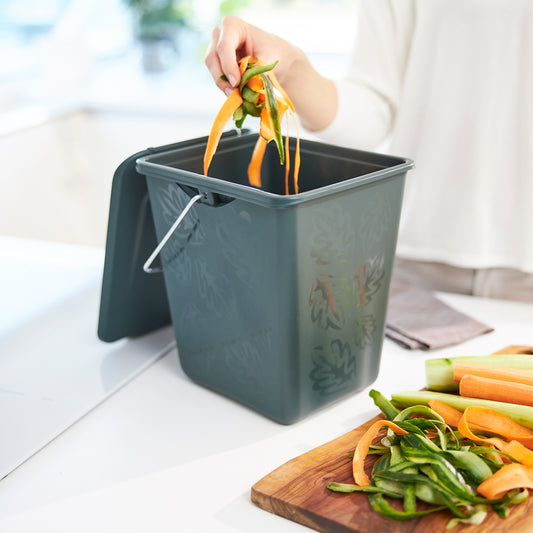Waste segregation system 6 l
ALBULA
Compost Bin 9L l
BIO
Wiaderko 4,5L mistletoe green
BIO
Compost bin 7 l
GREENLINE
Collection: Home composters
Nowadays, more and more of us are choosing to live according to the idea of less or zero waste. We are increasingly trying to reduce waste production. However, it is worth remembering that waste is not only metal, glass, or plastic. About 30% of the waste produced in households is plant waste, including eggshells, tea leaves, and vegetable peels. Organic waste also includes mowed grass, leaves, or wilted flowers. Plant scraps can be reused, and a home composter will help us with this task. The composting process is a great way to get rid of waste and produce natural fertilizer.
What is a home composter?
A home composter is a container designed for organic waste. We can throw into it:
- mowed grass,
- eggshells,
- fruit peels (including citrus fruits) and vegetable peels,
- waste from ornamental plants,
- wilted plants.
It should be remembered that bones, animal waste, paper, cigarette butts, fabrics, and spoiled food cannot be thrown into the composter.
Nutrients and plant materials, through aerobic decomposition, create compost, which is a natural fertilizer.
The composting process
To obtain valuable fertilizer from plant waste, certain rules must be followed. Namely, the first layer serving as drainage, which should be at the bottom of our home composter, is shredded branches. The next level of compost is peat or garden soil. The arrangement of the remaining layers is arbitrary. However, it is worth ensuring that after each subsequent addition of ingredients, the entire contents are mixed very well. Additionally, they should be sprinkled with soil from time to time, which is meant to absorb excess moisture. The finished fertilizer in the composter should be slightly moist, so regular watering is important, especially on hot summer days.
To speed up composting, a special mixture containing probiotic bacteria can be used, or earthworms can be added to the compost.
Natural fertilizer - key information
Valuable fertilizer from the composter is ready in a maximum of one year. Its readiness can be recognized by a pleasant smell (an unpleasant smell means that the compost has been poorly prepared) and a structure that closely resembles soil. Compost, also called the black gold of gardeners, should not crumble or stick to the hands. A liquid may appear at the bottom of the composter, which contains very valuable components, so it is worth diluting it with water and using it to water plants.
Where is a home composter suitable?
When deciding to set up a private home composter, we can buy a ready-made container, make our own, or create a pile.
- Home composter in the garden (pile)
This type of composter can be used in both large gardens and small plots. It does not require the purchase of additional containers. Home composting involves layering waste, which creates a pile directly on the ground. Unfortunately, open composters are not very aesthetic, so they are recommended for people who have a garden and can place them in a location shielded from human view.
Self-made home composter
In the garden, we can also set up a composter that we make ourselves. It is certainly an economical solution that works well in large gardens. Many people make composters from pallets. Unfortunately, this material is not durable, and changing weather conditions can destroy it.
How to make a home composter can be learned from instructional videos available on the Internet.
- Container for organic waste in the kitchen and on the balcony
For those without a garden or those who want to store fertilizer in an apartment, basement, or on a balcony, the best solution will be a plastic composter. It can be purchased, among others, in garden stores. A small home composter has a lid. This type of composter is an ideal solution for disposing of plant or vegetable scraps. It is most often chosen for its aesthetics, which do not disrupt the interior design. It can also be easily moved from place to place.
Other types of composters for organic waste
Among the types of containers for organic waste, rotating composters are also distinguished. They are usually made of plastic, in the form of a barrel. The container is suspended on a special rotating structure that allows for easy mixing and draining of excess moisture. This ensures that the composter provides adequate airflow, and the decomposition process is faster.
Size and price of composters
In the case of composters, their size can vary. Small composters usually have a capacity of 200 to 300 liters and are ideal as kitchen composters. With them, we can easily dispose of plant scraps, and the fertilizer from their interior will be enough to enrich a home vegetable garden. If we care about organic cultivation, it is worth purchasing a container with a capacity exceeding 1000 liters, and owners of very large gardens can equip themselves with a composter over 1600 liters.
A home composter is not expensive to purchase. Prices start at around 200 PLN. They depend primarily on its size, and the materials from which they are made also influence the price.
Why choose a plastic composter?
Our offer mainly includes plastic composters. Thanks to them, the decomposition and composting process is quick and easy. Plastic is an extremely durable material that ensures proper tightness and durability. The advantage of a plastic composter is the rapid decomposition processes. This happens because the home composter heats up faster and increases the decomposition of organic matter. As a result, we can enjoy natural fertilizer — compost — sooner. In a plastic composter, we can throw in coffee and tea grounds, vegetable and fruit peels, and wilted plants. As mentioned earlier, pet waste is prohibited from composting. A plastic home composter is a good way to compost scraps both indoors and outdoors.
If you want to support the environment, introduce ecological solutions in your home, and produce fertilizer for plants yourself, start composting!
If you have never used this solution before — ask us for details, and we will certainly dispel all your doubts.




